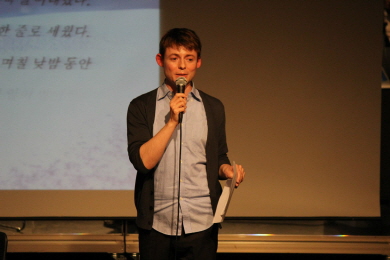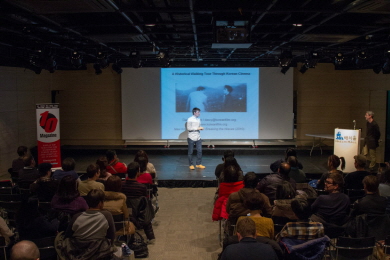
“When I was in Britain, I was a member of a regular book club, and we got together to talk about the book we had selected to read. I wanted to do something similar here,” Welsh remarked.
But this time his ambitions were bigger. Welsh wanted it to be more of a discussion “community” to find out diverse aspects of Korean history, literature and culture. In the beginning, the group started out very small as a Facebook group of no more than 10 people. He was on the verge of giving up. Then, an idea came up – inviting renowned writers to come and talk about their books.

“I knew a Korean-American writer, Krys Lee, who had written a collection of short stories in English dealing with Korean history. So I asked her to come to the club as a speaker,” he recalled.
Suddenly, the attendees more than doubled to 25 people at the speaker-event meeting. The success gave him a clue on how to attract more people. Extending the concept from a regular book club, he thought of a series of “literature events,” such as “meet the author” events.
The speakers are mainly Korean authors, foreign journalists, or expert writers who lived in Korea for a while. Invited were Gong Ji-young, writer of such novels as Our Happy Time and My Sister Bongsoon; Shin Kyung-sook, author of Please Look After Mom and I’ll Be Right There; and Lee Chang-rae, Pulitzer Prize nominated Korean-American author of Native Speaker.
Inviting Kim Young-ha, a Korean author of the novels Black Flower, Your Republic is Calling You and I Have the Right to Destroy Myself, was a turning point for the club, as the number of attendees jumped to almost 200 people. Welsh needed a bigger venue to accommodate the audience. In searching for a big and complimentary place for the club, he chose Haechi Hall in Myeondong, where he continues to host the meetings even now.
The club is attended by a mix of passionate readers from both Korean and foreign national origins. Regular attendees range from Korean students to international students, English instructors, military career people and professors. As the book club is open to both Koreans and foreigners, Welsh had to limit the speakers to those whose works have been translated into English.
“After all, if some people cannot read the book of the author, there is no point in attending the event,” Welsh said.
Through the process of selecting the translated works from Korean writers, Welsh found that most of the translated books reflect representative and typical aspects of the nation.
Welsh also discovered that the selection of Korean books is strictly confined to the typical grief of the country, the separation and the aftermath of the war. Genre novels do not get chosen for translation. Giving the example of Sweden, where lots of Swedish genre crime novels are getting translated and sold worldwide, he urged the change in the selection and publication of English-translated Korean literature.
“Although the translation works are quite limited, the potential sources of translation are diverse,” Welsh commented. “Look at Park Min-kyu, who represents postmodernism and magical realism, or Kim Young-ha, who represents modernism in Korean literature.”
By organizing regular meetings of the club, Welsh thinks he found his own approaching toward understanding another culture. By reading books of another culture and having a place where Koreans and people from international community could gather and talk, he found the value of “cross-cultural understanding and communication.”
“The realm of my quest for hidden traits of Korean literature and culture is infinite,” Welsh said. “I want to see how far I can take it.”
Lee Yoon-soo
yoonpamom@ewhain.net

